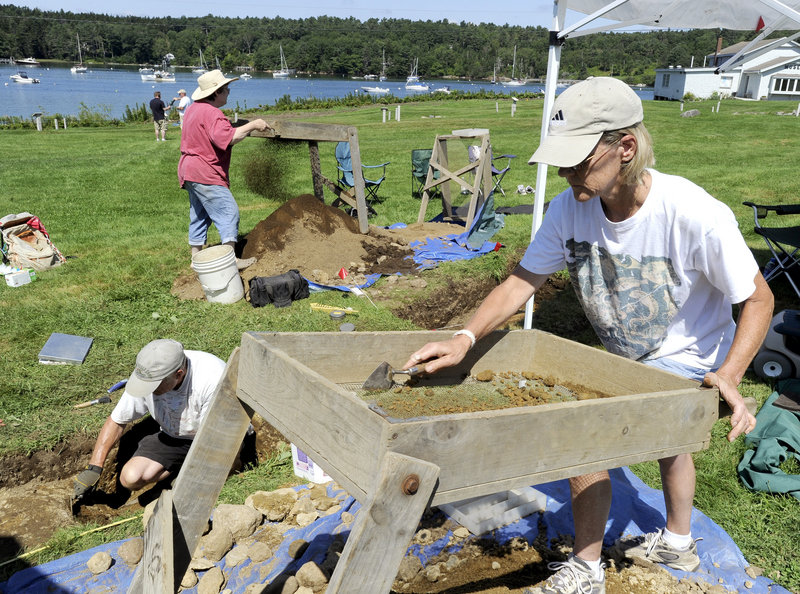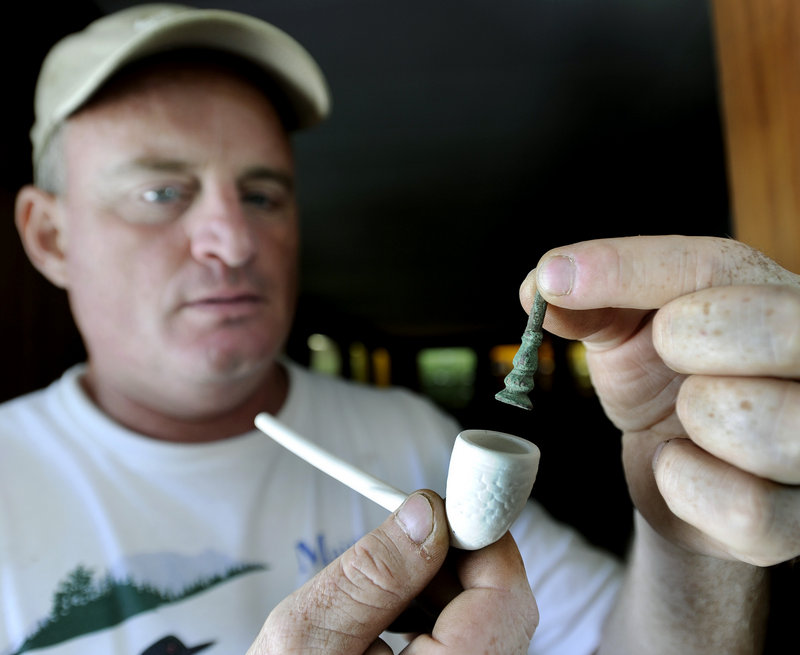NEW HARBOR – Cindy Hook was on a mission Wednesday, sifting earth dug up from the Colonial Pemaquid State Historic Site and sweating freely as she tried to spot any archaeological treasures that might be concealed in the dirt.
“The anticipation is the best part,” she said, “because you never know what you’re going to find.”
What Hook hoped to find were remnants of any structures from a 17th-century village that stood at the tip of this peninsula in midcoast Maine.
She and other volunteers have been working with state archaeologists in a weeklong dig to explore promising locations at the site, where British settlers landed close to 400 years ago and established a small fishing village.
Those colonists went on to build a permanent settlement on the grassy bluff overlooking Pemaquid Harbor, which is now a state historic site.
Several foundations of the village’s buildings have been uncovered in previous digs, along with more than 300 artifacts including pieces of pottery, china and nails.
The new dig targets several depressions in the grassy field, features that may indicate the site of old foundations or previously disturbed earth underneath, said Tom Desjardin, a historian with the Maine Bureau of Parks and Lands.
Once the archaeologists have selected a site to excavate, they measure out a 2-foot-by-5-foot tract, peel back the sod and dig down 10 inches at a time.
“We keep going deeper until we find a discolored layer; it may indicate prior use,” said Desjardin.
The excavated dirt is then shoveled onto a screen that separates the soil from any artifacts. On Wednesday, the archaeologists dug in one of the tracts and found several pieces of brick and charcoal, but no evidence of a foundation.
Desjardin said the land was bulldozed in the 1960s, which makes it difficult to place or date any items that might be found.
Even though the dig has yet to unearth a foundation, the week can be considered a success, said Carolyn McKeon, a board member of Friends of Colonial Pemaquid, the group that is sponsoring the dig.
“You can learn as much from what’s not there as from what is there,” McKeon said.
“I equate it to oil drillers drilling dry holes.”
Friends of Colonial Pemaquid is a nonprofit organization with about 400 members, most of whom live or spend summers in the area.
The organization’s mission is to promote Colonial Pemaquid’s historical significance and help support and maintain the historic site.
The all-volunteer organization raises money through yearly membership dues and events.
The total cost of the weeklong excavation is $5,000, said Lee Cranmer, a staff archaeologist with the Maine Historic Preservation Commission who is supervising the dig.
“I will also spend five to six weeks this winter documenting each artifact we find, as well as writing a site report,” Cranmer said.
Interesting artifacts were in short supply Wednesday, but earlier in the week Cranmer and a colleague found a metal pipe tamper from the late 16th century. Colonists used the tamper to pack down tobacco in their pipes.
All of the artifacts drew the curiosity of 16-year-old Becky Hook, whose mother was among the volunteers working the site.
She said, “I find it interesting to be able to look back hundreds of years and see how these people lived their lives.”
Staff Writer Max Monks can be contacted at 791-6345 or at:
mmonks@pressherald.com
Copy the Story Link
Send questions/comments to the editors.




Success. Please wait for the page to reload. If the page does not reload within 5 seconds, please refresh the page.
Enter your email and password to access comments.
Hi, to comment on stories you must . This profile is in addition to your subscription and website login.
Already have a commenting profile? .
Invalid username/password.
Please check your email to confirm and complete your registration.
Only subscribers are eligible to post comments. Please subscribe or login first for digital access. Here’s why.
Use the form below to reset your password. When you've submitted your account email, we will send an email with a reset code.